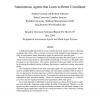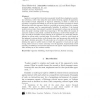70 search results - page 13 / 14 » Reinforcement Learning: Past, Present and Future |
AAMAS
2004
Springer
13 years 7 months ago
2004
Springer
A fundamental difficulty faced by groups of agents that work together is how to efficiently coordinate their efforts. This coordination problem is both ubiquitous and challenging,...
AAMAS
2005
Springer
13 years 7 months ago
2005
Springer
Agents in a competitive interaction can greatly benefit from adapting to a particular adversary, rather than using the same general strategy against all opponents. One method of s...
ICC
2007
IEEE
14 years 1 months ago
2007
IEEE
—While transparent WDM optical networks become more and more popular as the basis of the Next Generation Internet (NGI) infrastructure, such networks raise many unique security i...
CORR
2002
Springer
13 years 7 months ago
2002
Springer
We have analyzed manufacturing data from several different semiconductor manufacturing plants, using decision tree induction software called Q-YIELD. The software generates rules ...
SEMWEB
2009
Springer
14 years 1 months ago
2009
Springer
A key question regarding the future of the semantic web is “how will we acquire structured information to populate the semantic web on a vast scale?” One approach is to enter t...



